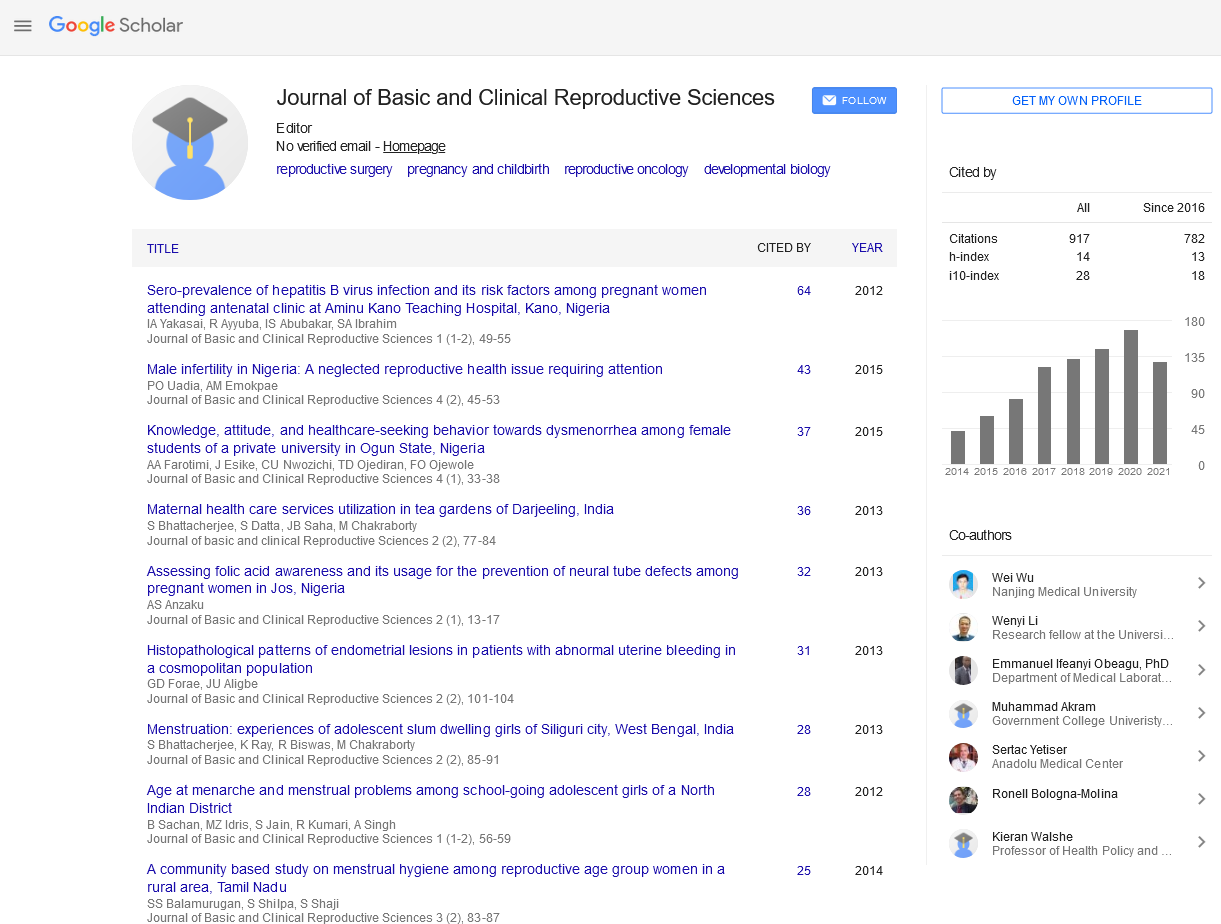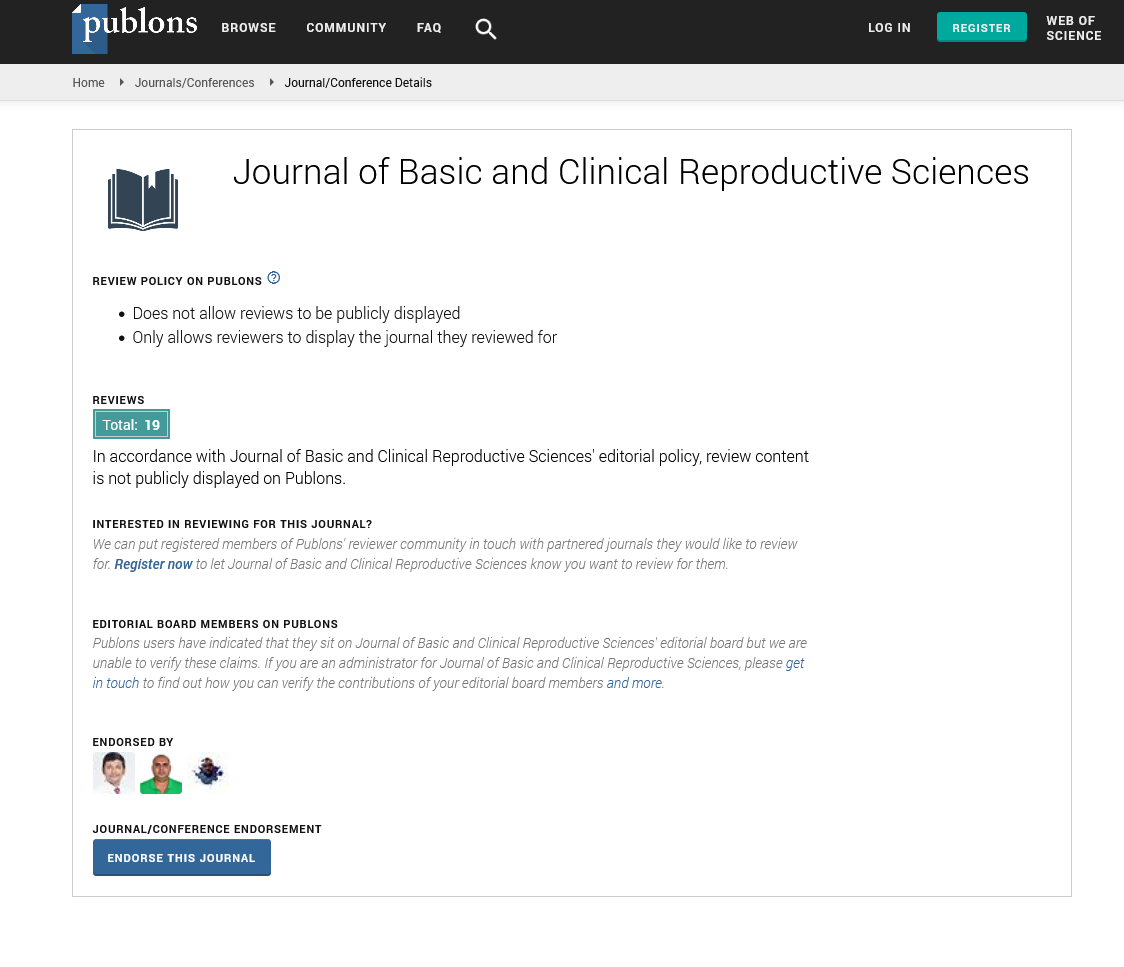Commentary - Journal of Basic and Clinical Reproductive Sciences (2023) Volume 12, Issue 5
Decoding the Future: Exploring Advances and Challenges in Reproductive Genetics
Received: 25-Sep-2023, Manuscript No. JBCRS-23-121561; Editor assigned: 27-Sep-2023, Pre QC No. JBCRS-23-121561 (PQ); Reviewed: 11-Oct-2023 QC No. JBCRS-23-121561; Revised: 18-Oct-2023, Manuscript No. JBCRS-23-121561 (R); Published: 25-Oct-2023
This open-access article is distributed under the terms of the Creative Commons Attribution Non-Commercial License (CC BY-NC) (http://creativecommons.org/licenses/by-nc/4.0/), which permits reuse, distribution and reproduction of the article, provided that the original work is properly cited and the reuse is restricted to noncommercial purposes. For commercial reuse, contact reprints@pulsus.com
Description
Reproductive genetics stands at the intersection of biology and technology, offering unprecedented insights into the intricate web of human life. As we delve into the realms of genetic knowledge, we uncover the profound impact that reproductive genetics has on shaping the future of generations. Reproductive genetics encompasses a wide array of scientific disciplines aimed at understanding and manipulating the genetic material that determines human characteristics. At its core, it involves the study of genes, the fundamental units of heredity, and the variations within them that contribute to the diversity of traits observed in individuals. Reproductive genetics goes beyond mere observation, actively seeking ways to intervene in the transmission of genetic information to influence the genetic makeup of future generations. Genetic counselling plays a pivotal role in reproductive genetics, providing individuals and couples with valuable information about the risk of hereditary conditions. Genetic counsellors guide prospective parents through the complexities of their genetic makeup, helping them make informed decisions regarding family planning. This crucial aspect of reproductive genetics empowers individuals to understand the potential genetic challenges they may face and facilitates proactive measures to mitigate these risks. One of the technologies within reproductive genetics is Preimplantation Genetic Diagnosis (PGD). This technique involves the examination of embryos created through In Vitro Fertilization (IVF) for genetic abnormalities before they are implanted in the uterus. PGD not only allows for the selection of embryos free from specific genetic disorders but also opens the door to choosing embryos with desired traits, paving the way for a new era of “designer babies. Reproductive genetics has become synonymous with advancements in Assisted Reproductive Technologies (ART), particularly In Vitro fertilization (IVF). IVF involves fertilizing an egg with sperm outside the body and implanting the resulting embryo into the uterus. This technique not only aids couples struggling with infertility but also facilitates the application of various genetic interventions, such as PGD, to ensure healthy pregnancies. The revolutionary CRISPR-Cas9 technology has catapulted reproductive genetics into a new era.
CRISPR, an acronym for Clustered Regularly Interspaced Short Palindromic Repeats, allows scientists to edit specific genes with unprecedented precision. While this technology holds immense potential for correcting genetic defects and preventing hereditary diseases, it also raises ethical concerns surrounding the manipulation of the human germline.
Ethical considerations
The rapid progress in reproductive genetics forces society to grapple with profound ethical questions. The ability to select and modify genes raises concerns about the potential for genetic discrimination, exacerbating existing social inequalities. Additionally, the manipulation of the germline raises ethical dilemmas related to unintended consequences and the unforeseen impact on future generations. Striking a balance between scientific advancement and ethical responsibility is imperative to ensure the responsible use of reproductive genetic technologies. As reproductive genetics advances, the need for comprehensive legislation and regulation becomes increasingly apparent. Governments and international bodies must establish frameworks that safeguard the ethical use of genetic technologies, ensuring equitable access and preventing misuse. Striking a delicate balance between promoting scientific innovation and protecting the well-being of individuals and society at large is a complex but necessary task.
Conclusion
Reproductive genetics stands at the forefront of scientific innovation, offering unprecedented opportunities to shape the genetic destiny of future generations. From genetic counselling to assisted reproductive technologies and the revolutionary CRISPR-Cas9, the field continues to evolve, presenting both promise and ethical challenges. As we navigate this complex landscape, it is crucial to approach reproductive genetics with a thoughtful and ethical mind set, ensuring that scientific progress aligns with the fundamental values of humanity. By doing so, we can harness the transformative potential of reproductive genetics while upholding the principles that define our shared humanity.


